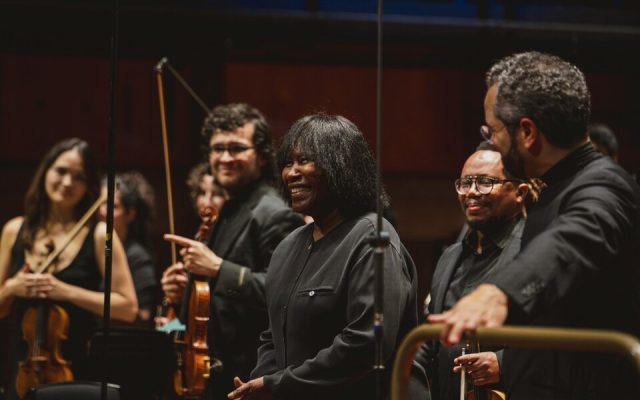

A review by Ivan Hewett for London’s Telegraph.
As the audience shuffled back into South Bank’s Queen Elizabeth Hall for the second half of Friday evening’s programme, Joan Armatrading lingered discreetly at one of the entrances to the auditorium. Having just witnessed the world premiere of her first classical composition – the appropriately titled Symphony No.1 – Radio 2 DJ Paul Gambaccini was among those who gathered to offer their praise. When I asked the pioneering singer-songwriter whether she had any thoughts to share about the occasion, she replied: “I’ll just say this. The orchestra were fantastic.”
Well, weren’t they just. Comprising 70 musicians, Chineke! Orchestra shimmied their way through a Friday night set featuring music from the 19th, 20th and 21st centuries (from Tchaikovsky, Duke Ellington and Armatrading respectively) without dropping a note. The ensemble, founded in 2015 by artistic director Chi-chi Nwanoku as Europe’s first majority black and ethnically diverse orchestra, combined virtuosity with a kind of progressivism not always seen on the stages of leading concert halls.
That Joan Armatrading, an artist whose resplendent career spans 56 years, has managed to stride so confidently, and so fluently, into a hitherto unploughed field is remarkable. A three-time Grammy nominee, the 72-year-old is best known for her 70s and 80s hits Love and Affection, Down to Zero and Me Myself I. She was also the first British female singer-songwriter to achieve international success. But at the Southbank Centre, the vivid vignettes and notable lyrics that marble her 20 studio albums certainly cast no shadow over a piece that transcended reasonable expectations of a composer new to the terrain. And while it may be unrealistic to compare a piece completed only last year with Tchaikovsky’s deathless Symphony No.5 – which closed the show, some 135 years after its own premiere in St Petersburg – it is fair to say that Armatrading is anything but diminished in its company.
Conducted by Andrew Grams, this was no facsimile of orchestral music. There were no floods of sickly violins, thank you very much, and no sentimental melodies. Instead, the symphony was by turns dramatic, mischievous, tuneful, percussive, soothing and surprising. Its finale was a thing of wonder. Eschewing the temptations of a thundering climax, the final notes were played with deep and declarative certainty by half a dozen double-bassists. Elongated and strong, it sounded like a groundswell. “We trust we’ve made our point,” it, and they, seemed to say.
At this, Joan Armatrading got up from her seat and made her way to the stage. As the audience rose to their feet, this daughter of Birmingham, economical as ever, raised a hand as if to say, “Thanks, but no big deal”. OK, sure, but one wonders if perhaps the title of her latest endeavour might just be telling. In what would be a welcome addition to this wonderful new piece of music, Symphony No.1 suggests, at least, that there may be more to follow.
A review by Ivan Hewett for London’s Telegraph. As the audience shuffled back into South Bank’s Queen Elizabeth Hall for the second half of Friday evening’s programme, Joan Armatrading lingered discreetly at one of the entrances to the auditorium. Having just witnessed the world premiere of her first classical composition – the appropriately titled Symphony






